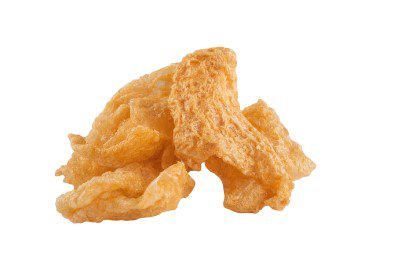

While dogs can obtain protein and collagen from pork rinds, the high saturated fat content of this snack makes it an unhealthy choice for dogs to consume in large amounts. Overconsumption can lead to obesity, cardiovascular diseases, and pancreatitis in dogs.
Pork rinds or pork skin can provide dogs with protein and collagen, which are beneficial for their muscle, bone, skin, and joint health.
Pork rinds contain high levels of saturated fat and calories, which can be harmful to dogs when consumed excessively. They are typically deep-fried in oil and heavily salted, which can lead to digestive upset, obesity, and pancreatitis in dogs. Additionally, many pork rind recipes include seasonings that can be harmful to dogs, such as garlic, onion powder, and MSG.
To minimize health risks, it is recommended to bake or dehydrate pork rinds in the oven instead of deep frying them and to skip the salt and seasoning. Feeding pork rinds to dogs should be done in moderation as an occasional treat, not as a regular part of their diet.
Pork Rinds for Dogs: Benefits, Risks, and Alternatives
Pork rinds, also known as chicharrones, are a popular snack made from deep-fried pork skin. While they can provide dogs with protein and collagen, they are also high in saturated fat and calories, making them an unhealthy choice for frequent consumption. Additionally, many pork rind recipes contain harmful seasonings like garlic and onion powder.
If you choose to give your dog pork rinds as a treat, it is best to bake or dehydrate them in the oven and skip the salt and seasoning. Feeding pork rinds to your furry friend should be done in moderation and only as an occasional snack, rather than a regular part of their diet.
Luckily, there are healthier alternatives to pork rinds that you can offer your dog. Some great options include carrots, bite-sized pieces of cooked chicken, and air-popped popcorn with no salt or butter added.
Have you ever given your furry friend pork rinds? Did they enjoy them? Let us know in the comments below!
Remember, your dog’s health is important, so always consult with your veterinarian before introducing new treats or making changes to their diet. And don’t forget to show them some love and affection—your furry friend will appreciate it!